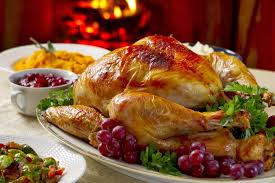Thanksgiving is a wonderful day to celebrate gratitude and all the good things that we have in our lives. However, Thanksgiving can also be a chaotic and difficult time for someone who has an eating disorder — or for anyone who has difficult family situations. Thanksgiving invites are usually based around food.  Turkey, pies, stuffing, potatoes, etc. Food, food and more food! When food is so prominent, it can wreak havoc on a person’s recovery from an eating disorder. Here are five tips to use to help navigate the weekend AND stay in recovery.
Turkey, pies, stuffing, potatoes, etc. Food, food and more food! When food is so prominent, it can wreak havoc on a person’s recovery from an eating disorder. Here are five tips to use to help navigate the weekend AND stay in recovery.
- Get in the driver’s seat. You are the one who is in charge of how you do with the food this weekend. No one else makes you binge, purge, restrict or do anything else with the food. You get to determine what you do with the food this weekend. Thanksgiving eating involves over eating. In other words, i
 f you over eat this weekend, you have actually engaged in normal eating! Challenge the ‘all or nothing’ thinking and just have some. Make things as easy as possible. Don’t make recovery harder than it needs to be by setting unrealistic expectations for yourself.
f you over eat this weekend, you have actually engaged in normal eating! Challenge the ‘all or nothing’ thinking and just have some. Make things as easy as possible. Don’t make recovery harder than it needs to be by setting unrealistic expectations for yourself. - Choose wisely. Don’t skip breakfast and/or lunch because you are going out for supper. This only sets you up to be overly hungry which is one of the vulnerabilities you can control effectively. Have some breakfast or lunch and allow yourself the grace to eat and enjoy the food at the celebratory meal. Thanksgiving is a normal time to eat towards a very full feeling on the satiety scale: 9 or 10 out of 10 for full. Eat the things that you wouldn’t normally eat. Allow yourself to taste the food — eat it slowly, chew it well and enjoy!
- It’s just one day (or one weekend). Eating disordered people have a tendency to be ‘all or nothing’ and perfectionistic. This leaves no room for human error and is highly shaming. What you do with food for one day or one weekend is not the hill to die on! What you do the other 364 days is what counts. Over eating on a celebratory day is not the way a person eats the rest of the time. Give yourself the grace to not micro-manage the food or shame yourself about what you do/don’t do with meals. It’s just one day/weekend!
 Your body is smart enough to settle it out over the next few weeks.
Your body is smart enough to settle it out over the next few weeks. - If you slip, get up ASAP. Depending on where you are at in your recovery, Thanksgiving can be a difficult event to navigate. If you end up having a slip, don’t panic. Just get back up and get back on track for the next meal. No “now I’ve blown it so what’s the point?!” You don’t have to go into a three day slip/eating disorder crash and burn/get back on track Tuesday! Also, if it gets ‘mucky’ and you feel like you aren’t doing well, acknowledge the struggle. Struggling is not the same as slipping.
- Reach out and use your support. You don’t have to do this alone!
 Leverage those closest to you to be your support team during this weekend. Think ahead as to how they can help you. What would be helpful? Make it as easy as possible not as difficult as you think you should be able to handle! Recovery is a temporary phase — this is not how you have to eat and reach out for support for the rest of your life. It’s how you can wisely navigate a big meal/holiday event at this point of your recovery. Don’t ‘wait and see’ how it goes. Plan how to be successful in your recovery, one day at a time (one meal at a time).
Leverage those closest to you to be your support team during this weekend. Think ahead as to how they can help you. What would be helpful? Make it as easy as possible not as difficult as you think you should be able to handle! Recovery is a temporary phase — this is not how you have to eat and reach out for support for the rest of your life. It’s how you can wisely navigate a big meal/holiday event at this point of your recovery. Don’t ‘wait and see’ how it goes. Plan how to be successful in your recovery, one day at a time (one meal at a time).




